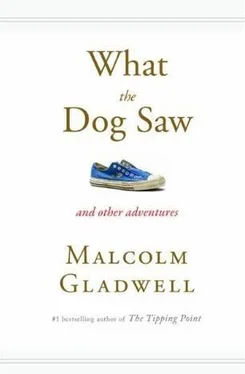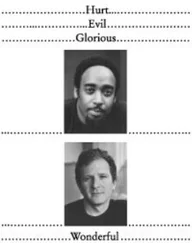One of Taleb’s earliest Wall Street mentors was a short-tempered Frenchman named Jean-Patrice, who dressed like a peacock and had an almost neurotic obsession with risk. Jean-Patrice would call Taleb from Regine’s at three in the morning, or take a meeting in a Paris nightclub, sipping champagne and surrounded by scantily clad women, and once Jean-Patrice asked Taleb what would happen to his positions if a plane crashed into his building. Taleb was young then and brushed him aside. It seemed absurd. But nothing, Taleb soon realized, is absurd. Taleb likes to quote David Hume: “No amount of observations of white swans can allow the inference that all swans are white, but the observation of a single black swan is sufficient to refute that conclusion.” Because LTCM had never seen a black swan in Russia, it thought no Russian black swans existed. Taleb, by contrast, has constructed a trading philosophy predicated entirely on the existence of black swans, on the possibility of some random, unexpected event sweeping the markets. He never sells options, then. He only buys them. He’s never the one who can lose a great deal of money if GM stock suddenly plunges. Nor does he ever bet on the market moving in one direction or another. That would require Taleb to assume that he understands the market, and he doesn’t. He hasn’t Warren Buffett’s confidence. So he buys options on both sides, on the possibility of the market moving both up and down. And he doesn’t bet on minor fluctuations in the market. Why bother? If everyone else is vastly underestimating the possibility of rare events, then an option on GM at, say, $40 is going to be undervalued. So Taleb buys out-of-the-money options by the truckload. He buys them for hundreds of different stocks, and if they expire before he gets to use them, he simply buys more. Taleb doesn’t even invest in stocks, not for Empirica and not for his own personal account. Buying a stock, unlike buying an option, is a gamble that the future will represent an improved version of the past. And who knows whether that will be true? So all of Taleb’s personal wealth, and the hundreds of millions that Empirica has in reserve, is in Treasury bills. Few on Wall Street have taken the practice of buying options to such extremes. But if anything completely out of the ordinary happens to the stock market, if some random event sends a jolt through all of Wall Street and pushes GM to, say, $20, Nassim Taleb will not end up in a dowdy apartment in Athens. He will be rich.
Not long ago, Taleb went to a dinner in a French restaurant just north of Wall Street. The people at the dinner were all quants: men with bulging pockets and open-collared shirts and the serene and slightly detached air of those who daydream in numbers. Taleb sat at the end of the table, drinking pastis and discussing French literature. There was a chess grand master at the table, with a shock of white hair, who had once been one of Anatoly Karpov’s teachers, and another man who over the course of his career had worked, in order, at Stanford University, Exxon, Los Alamos National Laboratory, Morgan Stanley, and a boutique French investment bank. They talked about mathematics and chess and fretted about one of their party who had not yet arrived and who had the reputation, as one of the quants worriedly said, of “not being able to find the bathroom.” When the check came, it was given to a man who worked in risk management at a big Wall Street bank, and he stared at it for a long time, with a slight mixture of perplexity and amusement, as if he could not remember what it was like to deal with a mathematical problem of such banality. The men at the table were in a business that was formally about mathematics but was really about epistemology, because to sell or to buy an option requires each party to confront the question of what it is he truly knows. Taleb buys options because he is certain that, at root, he knows nothing, or, more precisely, that other people believe they know more than they do. But there were plenty of people around that table who sold options, who thought that if you were smart enough to set the price of the option properly, you could win so many of those $1 bets on General Motors that, even if the stock ever did dip below $45, you’d still come out far ahead. They believe that the world is a place where, at the end of the day, leaves fall more or less in a predictable pattern.
The distinction between these two sides is the divide that emerged between Taleb and Niederhoffer all those years ago in Connecticut. Niederhoffer’s hero is the nineteenth- century scientist Francis Galton. Niederhoffer called his eldest daughter Galt, and there is a full-length portrait of Galton in his library. Galton was a statistician and a social scientist (and a geneticist and a meteorologist), and if he was your hero, you believed that by marshaling empirical evidence, by aggregating data points, you could learn whatever it was you needed to know. Taleb’s hero, on the other hand, is Karl Popper, who said that you could not know with any certainty that a proposition was true; you could only know that it was not true. Taleb makes much of what he learned from Niederhoffer, but Niederhoffer insists that his example was wasted on Taleb. “In one of his cases, Rumpole of the Bailey talked about being tried by the bishop who doesn’t believe in God,” Niederhoffer says. “Nassim is the empiricist who doesn’t believe in empiricism.” What is it that you claim to learn from experience, if you believe that experience cannot be trusted? Today, Niederhoffer makes a lot of his money selling options, and more often than not the person to whom he sells those options is Nassim Taleb. If one of them is up a dollar one day, in other words, that dollar is likely to have come from the other. The teacher and pupil have become predator and prey.
Years ago, Nassim Taleb worked at the investment bank First Boston, and one of the things that puzzled him was what he saw as the mindless industry of the trading floor. A trader was supposed to come in every morning and buy and sell things, and on the basis of how much money he made buying and selling he was given a bonus. If he went too many weeks without showing a profit, his peers would start to look at him funny, and if he went too many months without showing a profit, he would be gone. The traders were for the most part well educated and wore Savile Row suits and Ferragamo ties. They dove into the markets with a frantic urgency. They read the Wall Street Journal closely and gathered around the television to catch breaking news. “The Fed did this, the Prime Minister of Spain did that,” Taleb recalls. “The Italian Finance Minister says there will be no competitive devaluation, this number is higher than expected, Abby Cohen just said this.” It was a scene that Taleb did not understand.
“He was always so conceptual about what he was doing,” says Howard Savery, who was Taleb’s assistant at the French bank Indosuez in the 1980s. “He used to drive our floor trader (his name was Tim) crazy. Floor traders are used to precision: “Sell a hundred futures at eighty-seven.” Nassim would pick up the phone and say, “Tim, sell some.” And Tim would say, “How many?” And he would say, “Oh, a social amount.” It was like saying, “I don’t have a number in mind, I just know I want to sell.” There would be these heated arguments in French, screaming arguments. Then everyone would go out to dinner and have fun. Nassim and his group had this attitude that we’re not interested in knowing what the new trade number is. When everyone else was leaning over their desks, listening closely to the latest figures, Nassim would make a big scene of walking out of the room.”
At Empirica, then, there are no Wall Street Journals to be found. There is very little active trading, because the options that the fund owns are selected by computer. Most of those options will be useful only if the market does something dramatic, and, of course, on most days the market doesn’t. So the job of Taleb and his team is to wait and to think. They analyze the company’s trading policies, back-test various strategies, and construct ever more sophisticated computer models of options pricing. Danny, in the corner, occasionally types things into the computer. Pallop looks dreamily off into the distance. Spitznagel takes calls from traders, and toggles back and forth between screens on his computer. Taleb answers e-mails and calls one of the firm’s brokers in Chicago, affecting, as he does, the kind of Brooklyn accent that people from Brooklyn would have if they were actually from northern Lebanon: “Howyoudoin?” It is closer to a classroom than to a trading floor.
Читать дальше











